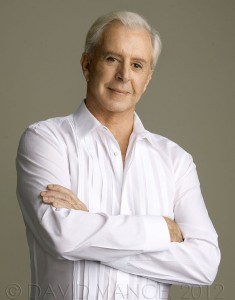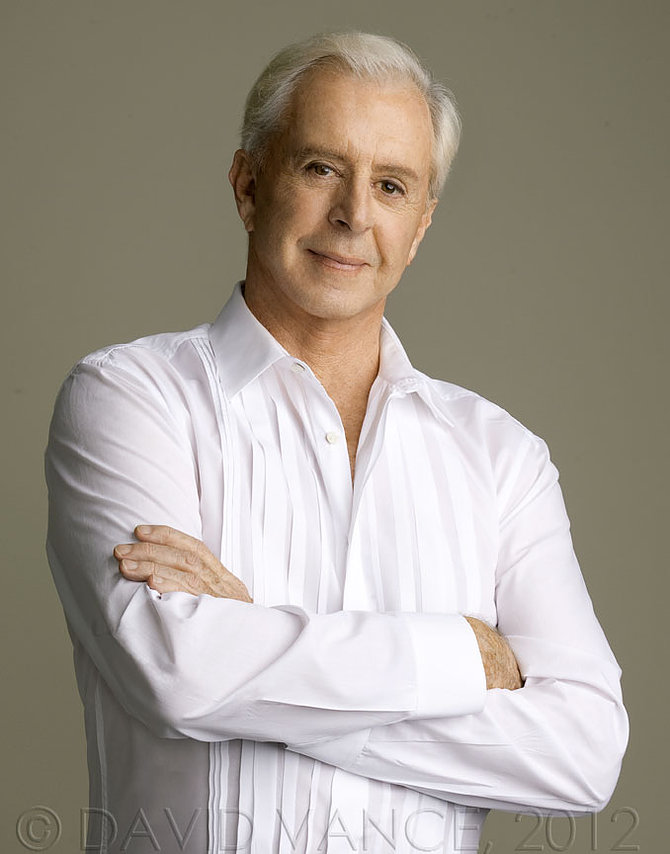DAVID LEDDICK may be known best for his homoerotic art books, though it could be for his many novels and memoirs—but then again, it could be for his musicals or film appearances. And yet he started his career as a dancer with the Metropolitan Opera and spent years in the advertising biz, in Paris, as creative director for Revlon and L’Oréal. You get the idea.

His Lambda Literary Award-winning photography volumes include Naked Men: Pioneering Male Nudes (1997) and The Male Nude (1998). His 28 books (and counting) include novels that touch on romance, erotica, and fantasy, while his latest memoir is titled We Offered Them Caviar (2016). There are even a few self-help books (with tongue in cheek), notably How to Be Gay (2012) and the just released How to Hit 70 Doing 100. His musicals, written with composer Andrew Sargent—in some of which he performed—include The Secrets of the Chorus, Quentin and I, Presenting Gilda Lilly, and Rent Boy… The Musical.
This interview was conducted by phone in December.
Stephen Hemrick: You’ve had an amazing number of different careers: as a dancer, an actor, a playwright, a novelist, among other endeavors. Can you comment on the overall trajectory of your career? Can it be divided into distinct phases?
David Leddick: Definitely. In the early part of my life, I had been in the Navy. And then I went to New York, and I was working in advertising. I was still very young. I decided that wasn’t a world I wanted to be in; it wasn’t right for me at all. I had been studying ballet for several years and thought how the only thing I really loved to do was dance, so I’m gonna go dance. And that’s what I did. I may have never been a very accomplished dancer, but at least I got to dance a lot, and I loved it! Then, when I was about 28, I realized that I was never going to be a star. I could see that younger people were coming in, and for dancers there’s a big difference between 22 and 28. When you’re young, you have a lot more energy.
SH: What came next?
DL: Then I worked in advertising for L’Oréal in France. I did a good job for them. At first they didn’t like me, because they didn’t like the idea of a foreigner telling them how to do anything. But everyone has certain jobs that they do well, whether they love what they’re doing or not. That’s what it was like for me in the world of advertising.
SH: When did you start writing?
DL: Since leaving advertising, I’ve written 28 books at this point, and I have three more in the works. I was very fortunate in that my first book, My First Date, was extremely well reviewed. One of my books, The Sex Squad, is about my dancing career; it all takes place at the opera.
SH: You also wrote a musical. Tell me more about that.
DL: Yes, the idea came from a book I wrote called Escort, which is forty interviews with photographers who sell sex. My manager suggested I make a musical out of it.
SH: Male sexuality has occupied a central place in your work, both through novels and photography books. Some have paid homage to serious photographers like George Platt Lynes in Intimate Companions, while others are frankly homoerotic, like Escort. Talk about the role that sexuality plays in your work, or in gay culture in general.
DL: I think sexuality should play a major role in everybody’s life, especially those in the gay world. I have a lover in Uruguay, and somebody pointed out to me the other day that I’m three times older than he is. But I have a sex life! I once said that if I could have a sex life until I’m ninety, then I would consider myself to have had a successful life. Defining what is a successful sex life is different for every person. But you have to have the sex life that you want to have. As long as it isn’t damaging to anyone else’s life, you should be entitled to it.
SH: You mentioned that your lover lives in Uruguay, where you have spent a lot of time and own property. How did this connection with Uruguay come about?
DL: I read Jorge Luis Borges, a major Argentinian writer who wrote of a magic in the streets of Montevideo. I had been to Buenos Aires, but I had never been across the river to Montevideo, which is very nearby. So I grabbed a friend and said, “We’re going to Montevideo to see if there’s magic in the streets!” And it definitely had something. You don’t see it so much in photographs. It’s an old city. Uruguay is a small, pie-shaped country with a long Atlantic coast, jammed between Brazil and Argentina. It only has 3.5 million people, half of whom live in or near Montevideo.
SH: Did you live in what might be called a gay neighborhood?
DL: For the size of the city, there are a good number of gay bars, though there isn’t so much of a gay neighborhood. Gay people live all over town. In Uruguay, being gay doesn’t mean anything to most people; they’re fine with it. They really don’t care about it one way or the other. It’s not a very modern country, but they’re not prudish and they’re not bigoted. They realize that people are different, and it’s not of any great interest to them.
SH: Where do you live now?
DL: I live in South Beach now, which is—or was when I first came here—a far more gay world. The interesting thing is, it isn’t that the gay people left; it’s that it’s been overwhelmed with other people. When I first came here [in 1983], it was a getaway for lots of gay people.
SH: Let’s talk some more about your books. How to Hit 70 Doing 100 would be of interest to many of our readers. What is your secret for “doing 100” as you enter a phase of life that finds many people slowing down?
DL: One thing is I believe is that you must remain “fuckable.” You have to take care of yourself. You have to exercise, and you have to keep a decent body. If you need plastic surgery to pull yourself up, just do it! I’m going to be 87, and I don’t consider myself part of the older people’s world. It’s all about one’s mindset. Many people think that when they hit seventy, they’re an old person. I didn’t and I still don’t feel old. I’d be happy if people think I’m in my late sixties.
SH: We’ve reviewed your book The Beauty of Men Never Dies; An Autobiographical Novel. The narrator describes four major romances with men that took place while serving in the U.S. Navy. How much of the book is based on your own experience, and how much of it is fictional?
DL: That book is pretty autobiographical. I might have glamorized it a little bit, but all of the relationships that take place in that book actually did happen in my life.
SH: You began writing fiction quite late in your career. Your latest book is a memoir, correct?
DL: My new book, We Offered Them Caviar, is my advertising memoir. So far I’m getting very good responses to it. It traces my life through all the various advertising agencies where I worked. I think it will be very useful to many readers, because it’s quite instructional on how one could have a successful career doing something that one is really good at but maybe doesn’t care that much about. I think that very often, for a lot of us, we have to support ourselves and earn money doing something that we don’t really like, but at least we do it very well, and that’s okay.
One’s personal life is something separate, and that can be very rich and very rewarding regardless of one’s career. You don’t have to become engulfed by your profession. Your profession is over there, and you do it. I think this is particularly true if you’re gay. But whatever you choose to do for a living, you should never pretend to be somebody else.
SH: What’s next on your agenda?
DL: I have two graphic novels. They’re kind of like comic book novels. One is called Two Bracelets and should be out within a month. The other, Murder on Shelter, has to do with a murder mystery on Shelter Island. I imagine they could both be made into a television series. After that, I’ll finish my autobiography, which will be called “Is It Hot in Here, Or Is It Just Me?”
I also want do a book that’s a series of interviews with people over seventy, because when I talk to other people in my age category, I often don’t find them thinking too much the way I do. I think it would be great for them to be able to read interviews with other people in their age group: what they think, how they feel, what they plan, what’s going on in their world. I think the big deal in our culture right now is that mature people over 65 should be planning one more fascinating chapter in their lives.
SH: Do you have anything else you want add?
DL: No… except that after the election, we’re now living in a world we didn’t even know existed. And I just want to tell everybody, keep your feet under you! Remember that no matter what’s going on around you, your job is to relish your own life. You can always do something interesting and live and grow, no matter where you are.
Stephen Hemrick, who lives in Boston, is the director of business development for this magazine.






Discussion1 Comment
I will miss David’s incredible postive outlook on life. He is the only man who put on eyeliner driving with me to the gym. He was am incredible individual that I knew well in the 1990’s.